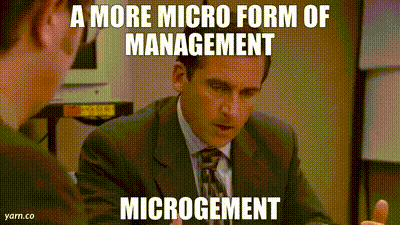Welcome to the League, Rook
New managers need more support to transition from individual contributor to management
When I was an analyst I couldn’t wait to get to management: simply tell people what to do all day and leave the office before the juniors. It looked like a dream - and then I got there and not only was it completely different than what I expected, but it was also completely different from what I was trained for. Having been a middle manager for many years now, I’ve come to learn a lot about how we train our team members to be managers (spoiler alert: we don’t do a great job.)
The Michael Scott Effect
This all boils down to what I colloquially call The Michael Scott Effect, but someone who reads books would call the Peter Principle (and no, it sadly is not named after Peter Griffin.)
The Peter Principle states, in short, that workers within an organization will rise to “a level of respective incompetence.” Essentially, you’re promoted for your past work with little to no consideration of how well you’d fare with your new work. In other words, you might be the best salesman at your mid-tier paper company, but that doesn’t mean you’re ready to run a branch yourself.
On top of all this, the transition from individual contributor to manager in most large companies is, to put it politely, a shitshow. Managerial training is not a major requirement (if offered at all) and the lines between what a manager is vs. an individual contributor are blurry at best and non-existent at worst. But it’s not always clear when it’s time to stop focusing so hard on managing multiple tabs in a spreadsheet and move towards spending time on managing multiple team members.
So, What’s a New Manager to Do?
If there’s no proper training at your job, but you now find yourself with direct reports (or even the dreaded “dotted line” reports - all of the responsibility, none of the credit), how can you prepare for the exciting world of people management?
First step: understand it’s not that exciting. Second step, pick up Harvard Business Review’s 10 Must Reads for New Managers. I bought this book when I leap-frogged into a management role via an agency hop (less than zero training when you do that, by the way) and it saved me many times. I also buy this book for every team member of mine who is taking on any kind of managerial role and have gotten very good feedback on it. Even if you’ve been an effective people manager for years, there will be nuggets in this book that will help you.
I could list a couple more tomes, but that would be boring and plenty of helpful lists already exist online. I do, however, think there are a couple of areas that managers - particularly new managers - would do well to heavily research and try to implement in their day-to-day managing. In no particular order…
Hiring: This has to be one of the hardest parts of being a manager. Attrition is inevitable, expansion is preferable - either way, you will need to hire people. Today’s system requires short meet-and-greets before deciding to bring someone on to an important role on your team. Getting good at this is crucial to being a manager that drives results for your company.

Feedback: No one likes giving feedback - it sucks to tell people where they’re falling short. But it’s also critical because, without proper feedback, teammates don’t grow and end up weighing the rest of your team down (plus it’s simply not fair if they don’t know where they need to improve.) Doling out positive feedback is also necessary, but it’s a lot easier. Nailing constructive feedback will supercharge a team.
Empathy: This is foolishly considered a “soft” skill, but it is where a lot of managers don’t stack up and end up shortchanging their teams and themselves. Empathy has a lot of other names - emotional intelligence, psychological safety - but the main tenet remains: people want to be managed by humans and want to be treated as humans. It sounds a lot easier than it is.
Delegation: The thing I struggled with most as a new manager was giving up control of a deliverable. Your success is no longer driven by your work product, but the team’s work product and that is hard to wrap your head around. Being able to effectively delegate while maintaining the quality of work product that got you promoted in the first place is a delicate balancing act and one that needs to actively be worked on. No one likes a micromanager.
Grab Bag Sections
WTF MTA: We need one-way turnstiles at Grand Central coming out of the 4/5/6 going up to Metro North. Trying to find a turnstile to exit at rush hour is a herculean task, with everyone trying to rush into the subway while everyone else is trying to rush out of the subway. Add in the tourists trying to figure out how the turnstiles even work, or the lag in the OMNY system between taps, and conditions are ripe for clusterfuckery. Those little arrows on the ground aren’t cutting it - we need exit-only turnstiles.
DALL-E Nightmare Fuel of the Week: This week we’re going to switch it up, and you can thank Georges Duverger, proprietor of Telegram Cookies (check them out!) Georges took a previous week’s DALL-E nightmare fuel prompt and put it into Midjourney. The results were good enough that maybe we should get more concerned about AI?

Quote of the Week: “A private who loses his rifle suffers far greater consequences than a general who loses a war.” - Unknown US Army officer, Iraq, 2007







